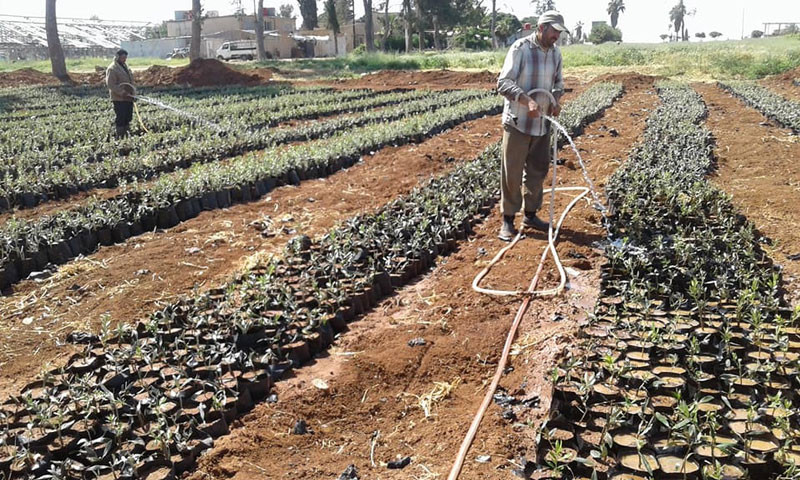



Syrian farmers have laid the foundations for the “Plant Nurseries’ Management in the Southern Area”. Through the project, they rehabilitated the plant nurseries in Daraa governorate, to restore the practicability of the agricultural action in the area.
The rehabilitation of the southern area’s plant nurseries started in 2015, after three years of inaction, due to the deterioration of the security conditions that the area suffered since the beginning of the conflict in Syria. The project managed to restore the agricultural activities in a very small area, despite the lacking resources, infrastructure and funding.
Under the supervision of Daraa Governorate’s Council, the project started with the rehabilitation of “Tall Shehab” and “Nahej” plant nurseries, to plant fruit trees, forest and olive trees, with simple capabilities that lack the infrastructure needed for such a massive activity.
One year after the launch of the project, in 2016, “Syria Project for Basic Services” Organization has adopted the project by funding all the logistics needed for its continuity, through providing green houses, irrigation networks and electricity generators; however, it did not cover the salaries of the employees, according to the Southern Area’s Plant Nurseries Project’s Director the engineer Khaled al-Hashish.
Engineer Khaled told Enab Baladi that the project’s success in its first year at the level of the production’s amount led the sponsor to renew the contract for another year. The contract ended in 2018, after which the project became self-funded, depending on the production’s returns.
As for the types that the nurseries produce, al-Hashish said that they include various types of olive trees, fruit trees (Apples, peaches, apricots, pears, quince, grapes and others) and forest trees (gum and Cypress), in addition to ornamental trees (umbrella and coral trees).
The plant nurseries director described Daraa’s people massive demand for planters from the “Tall Shehab” and “Nahej” plant nurseries. The nurseries management does not deal with merchants to sell the planters, contrastingly, it directly deals with the citizens as to prevent the manipulation of the prices.
He said that “when we started the project, the price of the olive planter was three thousand Syrian pounds. When the production increased, the same planter started to be sold for a nominal price that does not exceed 250 Syrian pounds.”
“Tall Shehab” plant nursery is one of the oldest among agricultural nurseries; it dates back to 1948 and specializes in producing olive planters through vegetative reproduction. The Ministry of Agriculture used to export the nursery’s olive products to a number of Arab countries, including Iraq, Jordan, Saudi Arabia, Qatar, Sudan, and Oman.
In 2012, the plant nursery ceased working after it went out of the regime’s control; the public lands in the nursery were turned into private assets, when some of the citizens started to exploit its lands utilizing the security chaos.
In an interview with Enab Baladi, Khaed al-Hashish, the director of the southern plant nurseries, said that one of their project’s goals was to preserve the public ownership of the nursery and preventing it privatization, pointing out that they managed to achieve that, thanks to the rehabilitation of the plant nurseries.
Concerning the exportation process, al-Hashish said that they are yet suffering many obstacles at the exportation level. He pointed out that the project’s management has communicated with the Ministry of Agriculture under the Syrian Interim Government, as to open the door for exportation to Jordan. However, the absence of an “agricultural quarantine” office, to examine and treat the products before exportation, has prevented the process, in addition to the Syrian opposition’s inability to conduct agricultural agreements with the Arab countries, which do not admit its legitimacy.
Despite all these obstacles, this year, the southern plant nurseries managed to export their products to Hama, Horan and Quneitra, in spite the difficulty of securing a permeant road for exportation between the Syrian governorates.
As the southern plant nurseries’ production focuses on covering the agricultural needs of southern Syria, they have lately sold 60 thousand planters of Quina, the price of each is a thousand Syrian pounds. As for the apricot, peaches, grafted prunus, the price of each planter is 200 Syrian pounds. Pears planters’ price, however, varies between 300 to 400 Syrian pounds.
Plant nurseries’ director mentioned a number of difficulties that are facing the project, on top of which is the weak monthly funding of the project’s employees, pointing out that the production’s returns are mostly used to cover the operational costs of the new season, including the costs of fuel, sand and planters’ pots; these returns, according to the director, are not enough to also cover the employees expenses, which threatens the project’s continuity.
He added that “Tall Shehab” nursery had 150 employees prior to 2011 and “Nahej” nursery used to have a staff of 100 employees. Today, the number of the employees, administrative, technicians and staff, in both nurseries does not exceed 40 people.
According to al-Hashish, the nurseries’ employ’s salary, today, does not exceed 35 thousand Syrian pounds, which does not correspond to the high cost of living in the area.
He also mentioned other obstacles which are represented by the plant nurseries’ infrastructure’s lack of readiness, for only a small area of 220 dunams of “Tall Shehab” plant nursery has been rehabilitated, as entire rehabilitation requires a large budget, in addition to lacking devices of solar energy, wells drilling and shortage of fuel in the markets.
if you think the article contain wrong information or you have additional details Send Correction